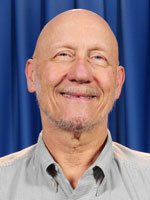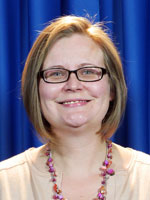Principal Investigator: James Austin, Center on Education and Training for Employment (CETE)
Co-Investigators: Robert Mahlman; John Moser
Project Dates: 7/06/2015 – 6/30/2016
Anticipated Total Award Amount: $59,465
Project Sponsor: Rehabilitation Engineering and Assistive Technology Society of North America
Task analysis and certification test revision (RESNA)
Two 3‐day item writing workshops will be conducted at CETE, one in 2015 (autumn) and the other in 2016 (suggest winter‐spring). CETE will create a distance training webcast (PPT with voice‐over posted to YouTube) for RESNA subject matter experts to minimize orientation time at the workshop proper. The scope of the project and activities planned for the three days will be the main topics). At CETE, RESNA panel members will be formed into smaller teams for item writing, each with a CETE facilitator who operates the database tool which records items and their auxiliary information (e.g., scenarios of common situations encountered in ATP practice).
Principal Investigator: Shawn Flanagan, Department of Human Sciences
Project Dates: 7/01/2015 – 6/30/2016
Anticipated Total Award Amount: $15,000
Project Sponsor: National Strength and Conditioning Association
Corticospinal representation of an injured knee
The strength and conditioning professional is well positioned to prevent or restore musculoskeletal function after injury. However, as exemplified by anterior cruciate ligament (ACL) ruptures, the prognosis for musculoskeletal injuries is disappointing, which may reflect the lack of emphasis on neurological aspects of injury in traditional rehabilitation programs. Thus, the purpose of this investigation is to determine whether the corticospinal representation of an injured knee differs when compared to the healthy knee of the same subject, and the healthy knees of subjects with no history of knee injury. To answer this question, we will employ state-of-the-art neurophysiological techniques to both stimulate and measure different aspects of corticospinal function, including the structural representation of movement, motor cortical excitability, cortical inhibition, central conduction times, and movement related activity. We will use functional magnetic resonance imaging to better localize electrophysiological measures of activity, in addition to providing clarification and validation. After determining the neurophysiological representation of knee injury, we will determine whether acute function can be improved during relevant movements through the use of cross education, and inhibitory or excitatory non-invasive stimulation (rTMS). The elucidation of structural or functional corticospinal abnormalities during the first eight weeks after ACL reconstruction in the injured knee will provide an important initial model for the neurological basis of injury. Furthermore, approaches to prevention and rehabilitation may be incorporated into strength and conditioning practices in addition to clinical and therapeutic rehabilitation programs.
Principal Investigator: Claire Kamp-Dush, Department of Human Sciences
Co-Investigator: Hui Zheng
Project Dates: 5/01/2015 – 9/29/2016
Anticipated Total Award Amount: $18,932
Project Sponsor: University of Denver
The causal effect of contemporary marriage on adults and families
The objectives of the proect are 1) Test whether specific family/couple characteristics identified in the literature as key factors that could impact program effectiveness; 2) Test theory-based mechanisms (mediators) of effectiveness; 3) Identify possible “positive break-ups”. Specifically, we will identify couple and family relationship characteristics that most strongly predict negative child outcomes, poor parenting and poor parental health when families have these risk factors; 4) Test whether being assigned to the intervention condition increased the likelihood of damaging/unhealthy relationships ending and/or of break-ups having a positive impact on child outcomes, parenting, and parental mental health.
Principal Investigator: Traci Lepicki, Center on Education and Training for Employment (CETE)
Co-Investigator: Robert Mahlman
Project Dates: 7/06/2015 – 6/30/2016
Anticipated Total Award Amount: $868,000
Project Sponsor: Ohio Board of Regents; US Department of Education
ABLE PDN FY16
To provide professional development products and services that support local ABLE programs’ capacity to increase student success including transition to postsecondary education, training and/or the workforce.
Principal Investigator: Kathryn Maguire Jack, College of Social Work
Co-Investigators: Kelly Purtell, Department of Human Sciences
Project Dates: 9/30/2015– 2/28/2017
Anticipated Total Award Amount: $148,943
Project Sponsor: Administration for Children and Families, US Department of Health and Human Services
Supporting low-income families: State variations in child care subsidies and TANF policies and children’s developmental ecologies
The study will address three broad aims. 1) Estimate how state-level child care subsidy and TANF policies are associated with take-up of such benefits; 2) Understand the role of receiving child care subsidies and TANF in short-term access to high quality child care, employment and education engagement, family wellbeing and parenting as well as long-term child behavior and academic outcomes and employment and education attainment. In this aim, we will also examine the short-term outcomes as potential mediators between receipt of these benefits and the longterm outcomes; and 3) Estimate the ways in which variations in state child care subsidy and TANF policies moderate the relationship between benefit receipt and access to high quality child care, short-term employment and education engagement, family wellbeing and parenting, and ultimately, children’s outcomes.
Principal Investigator: Arnulfo Perez, Teaching and Learning
Co-Investigators: Kathy Malone; Christopher Stewart
Project Dates: 10/01/2015 – 9/30/2017
Anticipated Total Award Amount: $1,201,385
Project Sponsor: Division Of Research On Learning, National Science Foundation
Functions for programming: Computer modeling in algebra
Research shows that meeting current and future demands for professionals in science, technology, engineering, and mathematics (STEM) careers in the U.S. will require major shifts in education, particularly in terms of classroom learning in K-12 settings. Computing has become an integral part of the practice of modern science, mathematics, and engineering. As a result, the STEM+Computing Partnership (STEM+C) program seeks to integrate the use of computation approaches in K-12 STEM teaching and learning. The Assessing the Impact of Computer Modeling and Programing in Secondary Algebra project will examine the impact of modeling and computer programming opportunities on students’ understanding of linear functions and their engagement in practices associated with STEM+C success. Through its focus on algebra — the most widely taken high school mathematics course — Computer Modeling in Algebra will pilot an approach that has the potential to put computer science squarely in the path of virtually every high school student. This project will combine the pedagogical content knowledge of researchers in STEM education and the computational prowess of computer scientists to infuse programming and computer modeling into a project-based algebra unit on linear functions taught to students from a range of backgrounds. Teachers and students will develop an understanding of computational thinking as a way of creatively approaching tasks using fundamental concepts from computer science.
Computer Modeling in Algebra will develop accessible yet relevant approaches to integrate modeling and computer programming experiences into algebra and to transform the mathematical understanding, problem-solving practices, and STEM+C investment of teachers and students alike. The project will pursue four main goals: (1) to effectively integrate modeling and computer programming into a project-based learning (PBL) unit on linear functions, (2) to prepare teachers to implement this unit — and computer modeling and programming more broadly — as part of their regular teaching in a classroom setting, (3) to assess the effect of the PBL unit on learners’ understanding of functions, persistence and confidence in problem-solving, and willingness to tackle open-ended tasks, and (4) to enhance students’ engagement in mathematics, computer science, and related fields, particularly among students from groups underrepresented in STEM and computer science. The project will use modeling-centered inquiry and project-based approaches in the study that reflect current research on the development of computational thinking and the incorporation of programming in K-12. The professional development experiences at the heart of the initiative will follow a participatory approach that engages teachers as partners in research, expands their understanding of pedagogical approaches that lead to success for all students (and especially low-income and minority students), and positions them to transform their teaching of linear functions by infusing computer modeling and programming into their algebra curriculum. The initiative will produce data on how integration of modeling and computer programming in mathematics can improve student understanding of functions and contribute to greater investment in, preparation for, and access to STEM+C fields. Through strategic curricular design, transformative teacher training, and close attention to student experiences and learning outcomes in traditional classroom settings, the study will pave the way for further integration of computer science into secondary mathematics to broaden the pipeline of students prepared for STEM+C careers.
Principal Investigator: Peter Rogers, College of Engineering
Co-Investigators: Denny Davis; Lin Ding (Department of Teaching and Learning)
Project Dates: 1/01/2016 – 12/31/2018
Anticipated Total Award Amount: $560,208
Project Sponsor: Division Of Undergraduate Education, National Science Foundation
Development and validation of assessments for industry-valued professional and technical learning outcomes in engineering education
To educate engineering graduates of higher value to industry upon graduation, curriculum reform requires effective assessment of knowledge, skills and abilities (KSA) such as project management, performance on multidisciplinary teams, critical thinking, addressing open-ended problems, thinking entrepreneurially, communicating with diverse audiences, taking calculated risks, and evaluating business and technical trade-offs. This project focuses on KSA assessment in senior capstone design courses where students gain technical and professional skills in realistic project experiences. The project team is defining and prioritizing required professional skills; developing, testing, and validating assessments that measure individual student achievement in diverse settings; and disseminating proven assessments through workshops, conference presentations, and focused communication vehicles including the Capstone Design Conference and an Internet-based Capstone Design Hub.
Validated assessment tools will apply to engineering capstone design courses of all disciplines, project types, team configurations, and student backgrounds. Instruments are being developed with input from and testing with diverse student populations, giving specific attention to female and minority populations. Psychometric analysis of the instruments will involve the use of Classical Test Theory (CTT) and Item Response Theory (IRT) psychometric analysis. Specifically, the Classical Test Theory will be used to analyze item properties (item difficulty and discrimination indices) as well as test properties (test reliability and discrimination indices). Results from the CTT analysis will allow the team to verify (a) whether items can collectively function well in testing what they are purported to test; and (b) if not, which items may warrant further inspection. A diverse community of practitioners is contributing to the ongoing refinement and implementation of the assessments in order for them to gain broad adoption, guide curriculum change, and benefit society through better educated engineers entering the global workforce.
Principal Investigator: Rachel Schachter, Crane Center for Early Childhood Research and Policy(CCEC)
Co-Investigators: Shayne Piasta
Project Dates: 9/02/2015 – 8/31/2018
Anticipated Total Award Amount: $39,701
Project Sponsor: Spencer Foundation
Preschool teachers’ use of assessment data
Principal Investigator: Tunde Szivak, Human Sciences
Project Dates: 7/01/2015 – 6/30/2016
Anticipated Total Award Amount: $15,000
Project Sponsor: National Strength and Conditioning Association
Warfighter adrenal response to extreme military stress
Principal Investigator: Christopher Zirkle, Educational Studies
Project Dates: 7/01/2015 – 6/30/2016
Anticipated Total Award Amount: $10,000
Project Sponsor: Ohio Department of Education
Ohio Department of Education CBI contract





